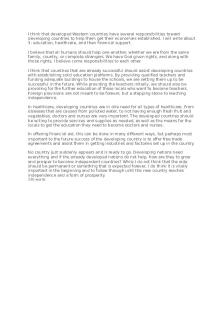Discussion Forum Unit 6 BUS 4405Discussion Forum BUS 4405 Leadership (proctored course) BUS 44 PDF

| Title | Discussion Forum Unit 6 BUS 4405Discussion Forum BUS 4405 Leadership (proctored course) BUS 44 |
|---|---|
| Author | shiley sentfromheaven |
| Course | Leadership (proctored course) |
| Institution | University of the People |
| Pages | 2 |
| File Size | 71.9 KB |
| File Type | |
| Total Downloads | 70 |
| Total Views | 129 |
Summary
Discussion Forum BUS 4405 Leadership (proctored course) BUS 4405...
Description
Discussion Forum Unit 6 BUS 4405 – Leadership
What is the importance for YOU as a leader of distinguishing between rumor, belief, opinion, and fact? We commonly interpret factual facts through the lens of our beliefs, feelings, tastes, and past experiences when formulating personal convictions. As a result, the majority of our comments in speech and writing are declarations of fact, opinion, belief, rumor or prejudice. The character of an assertion can either improve or lessen its utility and acceptance, depending on which of the following categories it belongs to: A fact can be verified. By looking into the evidence, we can find out if it's true. This could include figures, dates, testimonials, and so on. (For example, "World War II came to a conclusion in 1945.") If one assumes that measuring devices, records, or recollections are accurate, the truth of the matter is without dispute. Facts provide important support for an argument's assertion. However, facts are meaningless until they are placed in context, drawn conclusions from, and thus given significance. (Ramsey, 2021).
An opinion is a fact-based judgment, a sincere endeavor to draw a reasonable conclusion from facts. For example, we know that millions of people lack access to quality medical treatment. Therefore, you believe that the country should implement national health insurance, despite the fact that it would cost billions of dollars. Depending on how the evidence is understood, an opinion can be changed. Opinions have little power to persuade on their own. Always let your reader know what evidence you have and how it led you to your conclusion. (Ramsey, 2021).
A belief, unlike an opinion, is a conviction based on personal or cultural faith, morals, or values. "Capital punishment is legalized murder," for example, is referred to as an "opinion" because it expresses a viewpoint but is not supported by facts or other evidence. They can't be disproved or even challenged in a reasonable or sensible way. Beliefs cannot serve as the thesis of a formal argument since they are inarguable. (Of course, emotional appeals can be effective if you know your audience shares your values.). Rumor: "a tall tale about events spreading from person to person and referring to an object, event, or topic of public importance," according to Wikipedia. Prejudice, a half-baked judgment based on scant or unexamined evidence, is another type of claim that has no place in serious debate. (For instance, "women are lousy drivers.") A prejudice, unlike a belief, is testable: it can be questioned and disproved using facts. We frequently form preconceptions or accept prejudices from others—family, friends, the media, and so on—without evaluating their meaning or putting them to the test. Prejudices are, at best, careless oversimplifications. At worst, they reveal a worldview that is limited. Most importantly, they are unlikely to gain your readers' trust or agreement. (Ramsey, 2021).
Reference Fowler, H. Ramsey. (2021) Distinguishing Fact, Opinion, Belief, and Prejudice Retrieve from https://writing.colostate.edu/guides/teaching/co300man/pop12d.cfm...
Similar Free PDFs

BUS 1001 Discussion Forum UNIT 3
- 1 Pages

BUS 2201 Discussion Forum Unit 1
- 2 Pages

Discussion forum Bus Com unit 4
- 1 Pages

BUS 1101 Discussion Forum Unit 1
- 3 Pages

Discussion forum wk 8 bus 2207
- 1 Pages

BUS 5113 - Unit 6 Discussion
- 4 Pages
Popular Institutions
- Tinajero National High School - Annex
- Politeknik Caltex Riau
- Yokohama City University
- SGT University
- University of Al-Qadisiyah
- Divine Word College of Vigan
- Techniek College Rotterdam
- Universidade de Santiago
- Universiti Teknologi MARA Cawangan Johor Kampus Pasir Gudang
- Poltekkes Kemenkes Yogyakarta
- Baguio City National High School
- Colegio san marcos
- preparatoria uno
- Centro de Bachillerato Tecnológico Industrial y de Servicios No. 107
- Dalian Maritime University
- Quang Trung Secondary School
- Colegio Tecnológico en Informática
- Corporación Regional de Educación Superior
- Grupo CEDVA
- Dar Al Uloom University
- Centro de Estudios Preuniversitarios de la Universidad Nacional de Ingeniería
- 上智大学
- Aakash International School, Nuna Majara
- San Felipe Neri Catholic School
- Kang Chiao International School - New Taipei City
- Misamis Occidental National High School
- Institución Educativa Escuela Normal Juan Ladrilleros
- Kolehiyo ng Pantukan
- Batanes State College
- Instituto Continental
- Sekolah Menengah Kejuruan Kesehatan Kaltara (Tarakan)
- Colegio de La Inmaculada Concepcion - Cebu









